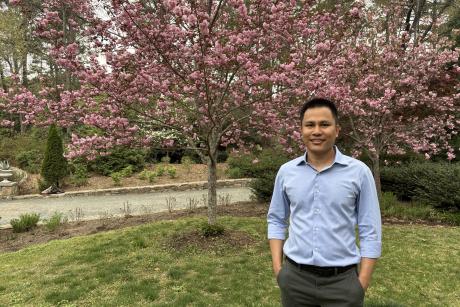
Fellow Juntos team member, Emma Zhao, and I are awestruck by the facts presented us regarding the healthcare opportunities for HIV-positive individuals in this country.
Published September 24, 2014, last updated on April 7, 2020 under Voices of DGHI
Admittedly, this isn’t a topic that usually crops up in conversation amongst total strangers. Bizarre as it may sound, this reality could very realistically be at the root of very pertinent health/social issues, including harm reduction for individuals with HIV/AIDS. While I can understand the hesitation to broach a subject that is not only controversial, but often downright awkward, I’m starting to believe that this cycle of suppression is exactly the problem. Only a couple of decades ago, openly discussing, let alone committing, the dirty deed prior to marriage was an abomination comparable to the seven deadly sins. Thanks to the Sexual Revolution of the ’60's and ’70's, engaging in pre-marital sexual acts became much less taboo. Though this shift in cultural norms certainly granted fuller freedom of emotional and sexual expression, it by no means eradicated all forms of stigma. Today, some thirty years later, some of our nation’s most vulnerable populations — youth, poor, racial and sexual minorities — just to name a few, still suffer at the expense of a severe lack of discussion.
I won’t soon forget the giggles and general sense of shock that filled the room when a lecturer at the NC Advocacy Conference uttered that loaded word: sex. As comical as it can be to discuss this private topic in very formal and very public forums, there is nothing funny about the thousands of individuals in the state of North Carolina alone who do not know how to properly arm themselves against the threat of HIV/AIDS — or worse, have absolutely no idea that they themselves are infected. Ironically, the already hushed whispers that accompany this subject are almost non-existent amongst the most affected individuals: non-white young MSM. From my work on the research project Juntos: A Digital Health Intervention, I’ve heard time and again how this group must live in fear that the details of their intimate lives will be found out and used against them for public humiliation. Because of deep-seeded social constructs, which disproportionately affect minority communities, “at risk” populations are forced into perpetual silence.
Solely based upon the stigma surrounding the topics of sex and consequent risks like HIV, I would have thought that all those who tested HIV-positive bore giant red marks on their foreheads. There must be something that outwardly distinguishes an HIV-positive individual from his/her peers, right? Wrong. For the first time in my life, I sat, laughed, cried, ate, cheered, celebrated, bemoaned amongst a number of individuals who have been infected with HIV, and had I not been at this particular conference, I wouldn’t have been the wiser. I was both awestruck and inspired by their stories of struggle, survival, and preparation for the future. I learned that the face of HIV is the preacher, the next-door neighbor, the nurse, the hairdresser, the businessman, and the student. I was saddened by the realization that their lives could have been dramatically altered had someone simply bothered to talk to them about the various dimensions of sex, including it’s risks, harm reduction methods, and healthcare options. In addition to the formalities, however, I would hope that healthcare professionals would be competent in addressing the often undiagnosed psychological toll that societal norms have perpetuated. Many conference attendees made perfectly clear that it is one thing to offer a condom, and a completely separate thing to offer emotional support.
If well-known AIDS advocate Wanda Brendle-Moss and so many others at the NC Advocacy Conference can speak openly about their status despite the social risks that their vulnerability entails, then so too can we engage in productive conversations about sex. In regards to HIV/AIDS, I would definitely say that talk is far from cheap.


